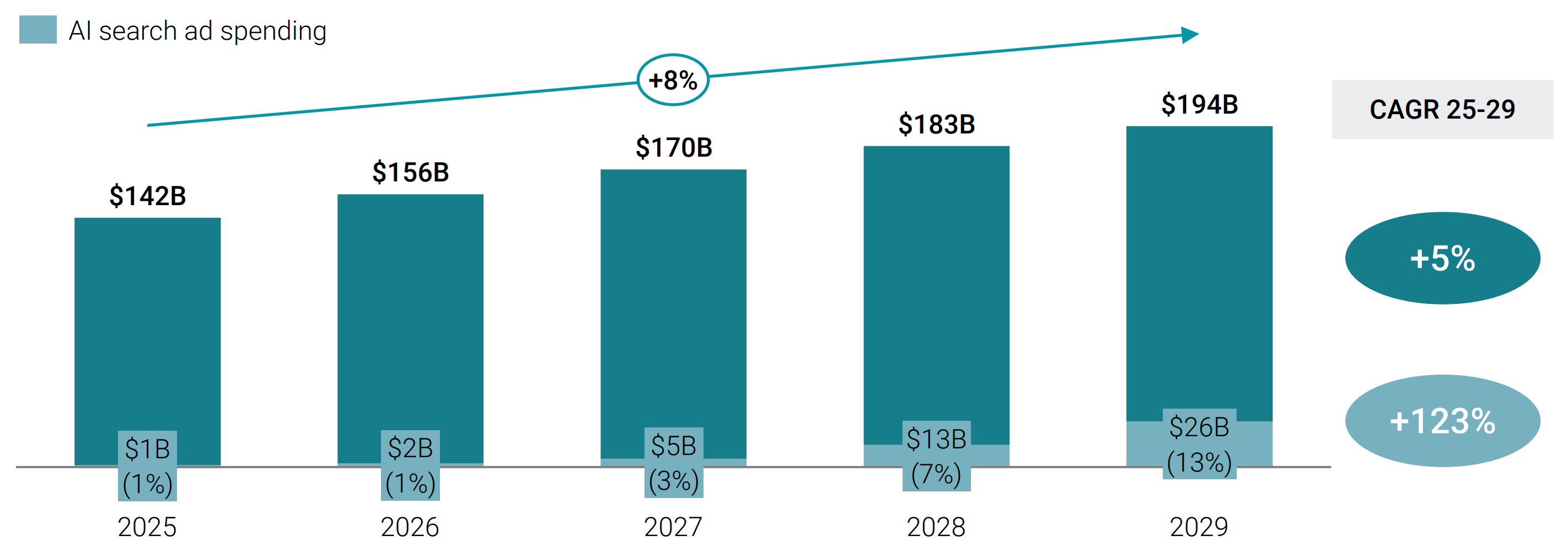The transformation of search and information access will be defined by two converging shifts:
Blue links give way to AI answers: Search will increasingly center around AI-generated summaries, dynamic answers, and results that mix regular content with paid placements, with real value coming from citations inside answers. GEO, measurement, and device dynamics will define strategy, all anchored in structured data and new ad models.
From chatbots to search agents: Search is transitioning from basic bots to fully context-aware agents that can recommend, compare, and transact—all within the platform experience itself. These agents will integrate discovery, action, and seamless monetization into a single point of interaction. Readiness checklists should include robust schema, feeds, APIs, and measurement frameworks for deep integration and future-proofing.
Last year, we wrote about the rise of generative AI sparking a paradigm shift in how consumers discover information online. Entering 2026, the search marketplace is undergoing its sharpest transformation yet.
Search is no longer a single destination—it’s morphing into a fragmented, AI-native, multimodal ecosystem. The once-dominant “blue links” era is quickly eroding, replaced by answer-first, agentic AI experiences and a proliferation of discovery channels. With disruption comes opportunity: Organizations preparing for this new ecosystem today are best positioned to win in the emerging AI search economy.
Generative AI is expanding search’s total addressable market (TAM) by an estimated $26 billion in the U.S. alone by 2029, creating new ad formats, new measurement models, and new monetization layers. In 2025, AI-driven advertising formats have already topped $1 billion in U.S. spend across Google’s AI Overviews (AIOs), ChatGPT, Microsoft Copilot, Amazon Rufus, and Perplexity—and growth is only accelerating.
Projected U.S. search advertising spend (2025-2029)

But this expansion also brings fragmentation. As AI broadens what it means to “search” online, competition is intensifying across a wider range of platforms (social, retail, and voice assistants) and modalities (text-based, voice, visual, and video search).
The AI browser wars are only heating up. A new wave of browsers embedded with AI and emerging agentic capabilities is setting the stage for the next frontier of search. Google’s Search Generative Experience (SGE) is already blending AI-generated overviews with classic web results, while challengers like Perplexity’s Comet and OpenAI’s newly announced ChatGPT Atlas are racing to deliver deeper intelligence and seamless task execution. The bar is rising fast—and the era of agentic search is underway.
Key themes
The SERP reset: From “blue links” to AI answers
Search is shifting from link lists to AI-powered answers, reducing clicks and raising the value of being cited in AI results. By late 2025, 56% of Google pages featured AI Overviews, driving zero-click behavior. Marketers must adopt “citation-first” strategies with structured, machine-readable content to ensure discoverability. Traditional links remain important, but hybrid search experiences—blending discovery, decision-making, and task completion—will dominate. Success depends on consistent, accurate content across platforms, with measurement focusing on business impact rather than CTR, marking a structural reset for search marketing and AI integration in 2026.
Agentic search will compress consideration and accelerate commerce once trust is built
Search is evolving into an agent-driven experience, guiding users from discovery to purchase. Tools like Perplexity’s Comet and ChatGPT Atlas automate multi-step tasks, from product comparisons to transactions. Mainstream adoption depends on trust, privacy, and regulatory frameworks, especially in Europe. Brands that provide structured content, live SKU feeds, and robust APIs gain an advantage. Agentic search compresses customer journeys, reduces friction, and shifts marketing measurement to outcomes like assist rates and completions. Those that adapt early will benefit from shorter, personalized paths to conversion, establishing a competitive edge in the AI-driven search economy.
As a result, the horizon for these predictions is longer and more uncertain, but we would expect over time the following (likely beyond 2026):
Agents will handle the entire journey, from exploration and recommendation to transaction— raising the premium on “agent-ready” brands with structured content, live SKU and price feeds, and robust APIs.
With fewer but deeper consumer interactions, measurement focuses on proxies such as assist rate, completion, and tight integration with marketing mix models.
Sales and service functions will increasingly harness agents to replace multi-step web journeys with direct, measurable outcomes—driven by trust, privacy, and tangible utility.
Adoption rates will depend on building layers of trust and explainability for consumers, as we saw with online and mobile payments.
2026 Media & Entertainment Industry Predictions Report
The media and entertainment world is shifting faster than ever—from streaming platforms merging short-form, long-form, and live content, to AI upending search and gaming, and M&A activity reshaping the landscape. Our annual Predictions Report dives into these trends, exploring who’s leading the charge, what’s next, and how businesses can stay ahead in a market defined by change. Click through to see where the industry is headed—and where opportunity lies.





